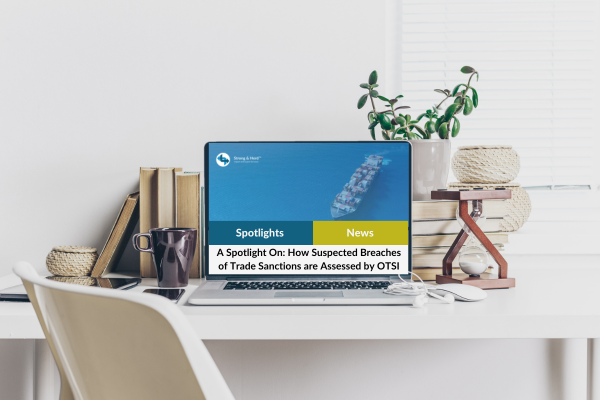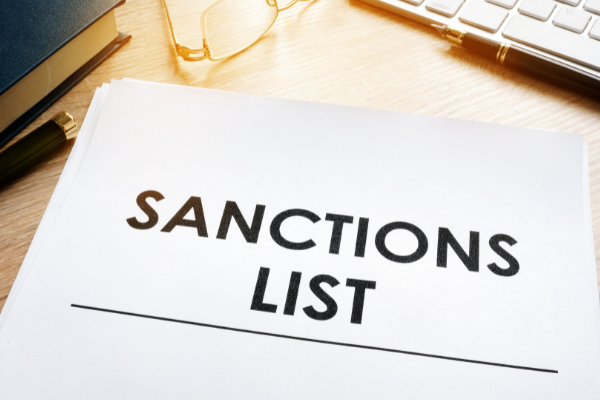BY:
SHARE:

A recent update from the Office of Trade Sanctions Implementation (OTSI) has put businesses that deliberately or unknowingly breach UK/International sanctions on notice.
The range of suspected breaches is broad and can include:
- Providing or procuring sanctioned services
- Moving, making available, or acquiring sanctioned goods outside the UK
- Transferring, making available or acquiring sanctioned technology outside the UK
- Providing ancillary services to the movement, making available or the acquisition of sanctioned goods outside the UK
- Providing ancillary services to the transfer, making available or acquisition of sanctioned technology outside the UK
OTSI has the power to investigate and enforce fines and penalties relating to breaches of trade sanctions, which can include:
- Circumvention, such as intentionally facilitating the contravention of sanctions
- Exceptions, such as failing to comply with the notification requirement of an exception
- Information requests, such as intentionally obstructing an information request from OTSI
- Licensing, such as failing to comply with the conditions of a licence
- Record keeping, such as failing to comply with the record keeping requirements of a general licence
- Reporting obligations, such as a relevant person failing to comply with their obligations to report suspected breaches
OTSI can issue warnings and use its powers to publish information about breaches, impose civil monetary penalties and refer cases to HM Revenue and Customs (HMRC) for criminal investigation. OTSI can also report individuals and businesses to their regulator, if they have one, and share information with organisations such as Companies House or the Insolvency Service.
It is important to remember that Trade sanctions apply to:
- All individuals or businesses within the territory and territorial sea of the UK
- All UK nationals or UK businesses established under UK law, wherever they are in the world
This means OTSI can investigate suspected breaches committed by:
- Individuals and legal entities who are within, or undertake activities within, the UK’s territory
- UK individuals and legal entities established under UK law, regardless of where in the world the breach takes place
Breaches of Trade Sanctions are assessed and based on the severity of the violation. For the most egregious cases, outcomes can range from warning letters to referrals to HMRC. Financial penalties up to £1m may be incurred, and in some cases, the withdrawal of export privileges cannot be ruled out where it is judged that there are no mitigating factors that might warrant a lesser fine/penalty.
The OTSI notification is keen to highlight the fact that ‘most breaches of trade sanctions will be assessed as ‘strict liability’ offences, meaning that ‘OTSI does not need to prove that you acted knowingly, or with intent.’ Put another way, ‘ignorance is no excuse in the eyes of the law.’ This emphasizes the importance of maintaining a robust training program within your organisation, particularly focusing on trade sanctions, due diligence, red flags and ‘know your customer.’
Some questions your organisation should be asking itself as part of your due diligence obligations might include:
- Does my organisation maintain a robust trade compliance program?
- Does my organisation employ a ‘Denied Party’ Screening Tool?
- Has trade compliance training been rolled out across my organisation involving all segments of the business?
- Does my organisation carry out due diligence on our customer base as part of our ‘know your customer’ obligations?
- Does my organisation keep up to date with changes to export controls?
Of course, the above is not an exhaustive list of measures that should be taken to avoid any breaches of trade sanctions. In addition, training should be tailored to your organisation’s risk profile, and appropriate actions should be taken when risks are identified. Remedial measures should be put in place to mitigate the risks.
It should be noted that OTSI will consider mitigating factors, which can include voluntary disclosure, full cooperation with any potential investigation, and a good awareness of trade sanctions. Coupled with business-wide trade sanctions training augmented, of course, by robust policies and procedures.
So, if you want to avoid ‘the long arm of the law’ by not breaching trade sanctions, do the right thing by creating awareness and providing internal training throughout your organisation. Remember, it costs more to do it wrong than it does to do it right!
Strong and Herd can provide all the training required to help you avoid the clutches of OTSI and other government enforcement agencies.
OneCall™ Email assistance as and when required; A one-call solution for all your import, export and customs enquiries. Export help. Import help. Customs help.
Stay informed about customs and international trade matters by subscribing to our OneCall™ service. This comprehensive offering includes a dedicated email helpline for support, timely practical updates direct to your inbox (Did You Know?), monthly UK Customs & Trade Briefings and access to an interactive members' area with an exclusive community for our subscribers.
International Trade Updates & Spotlight Newsletter
Subscribe to our free information emails covering international trade topics...













